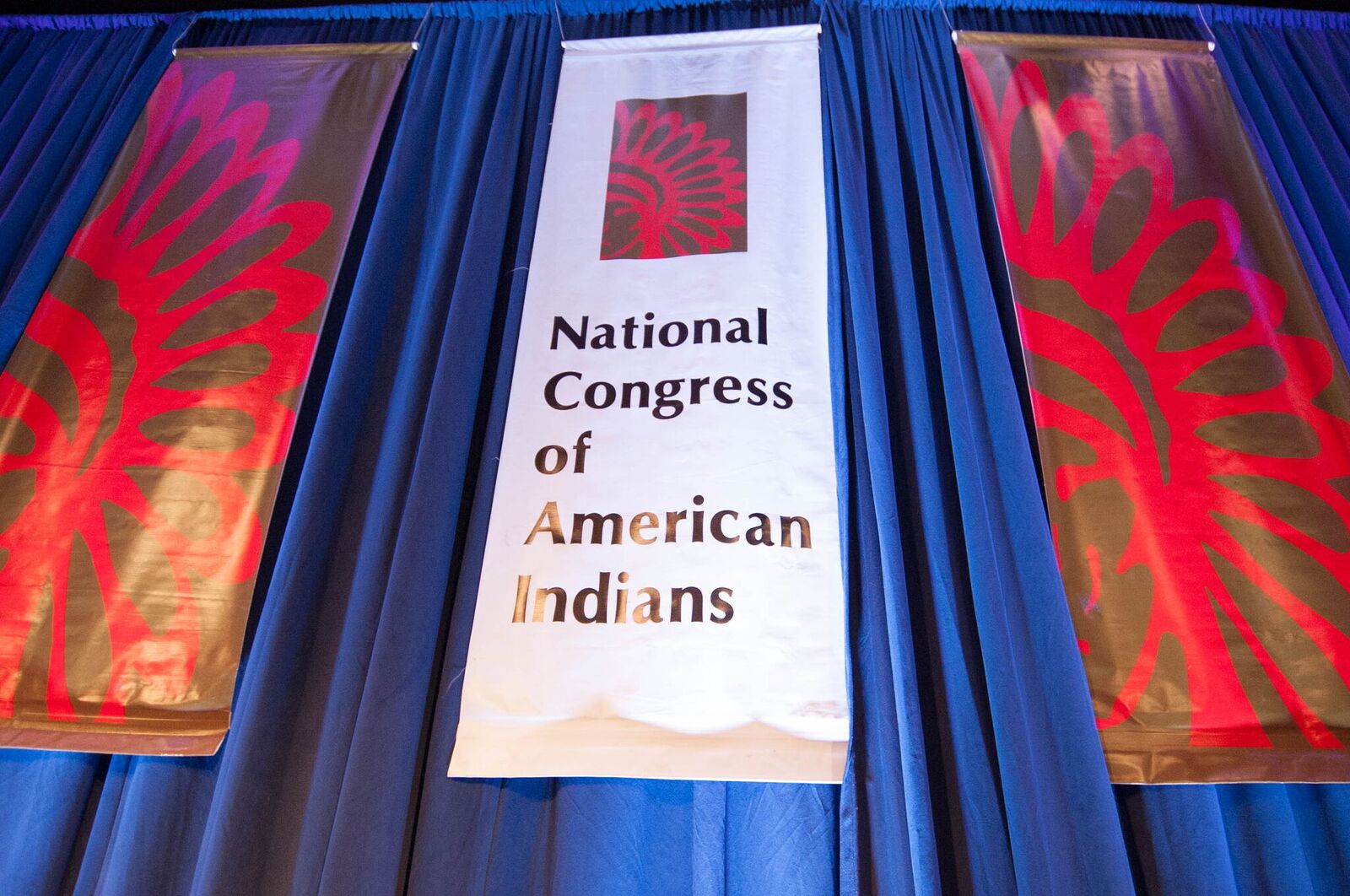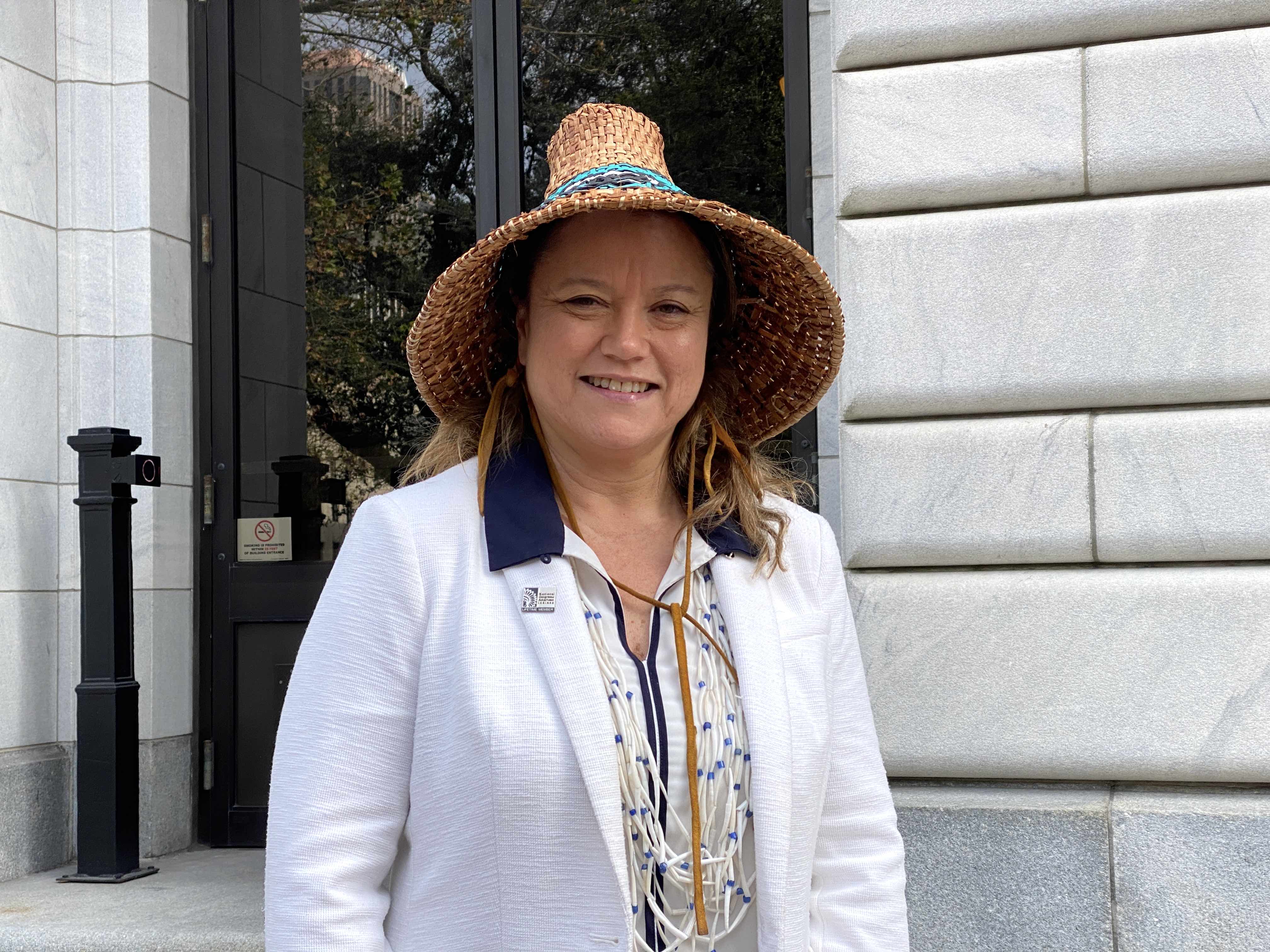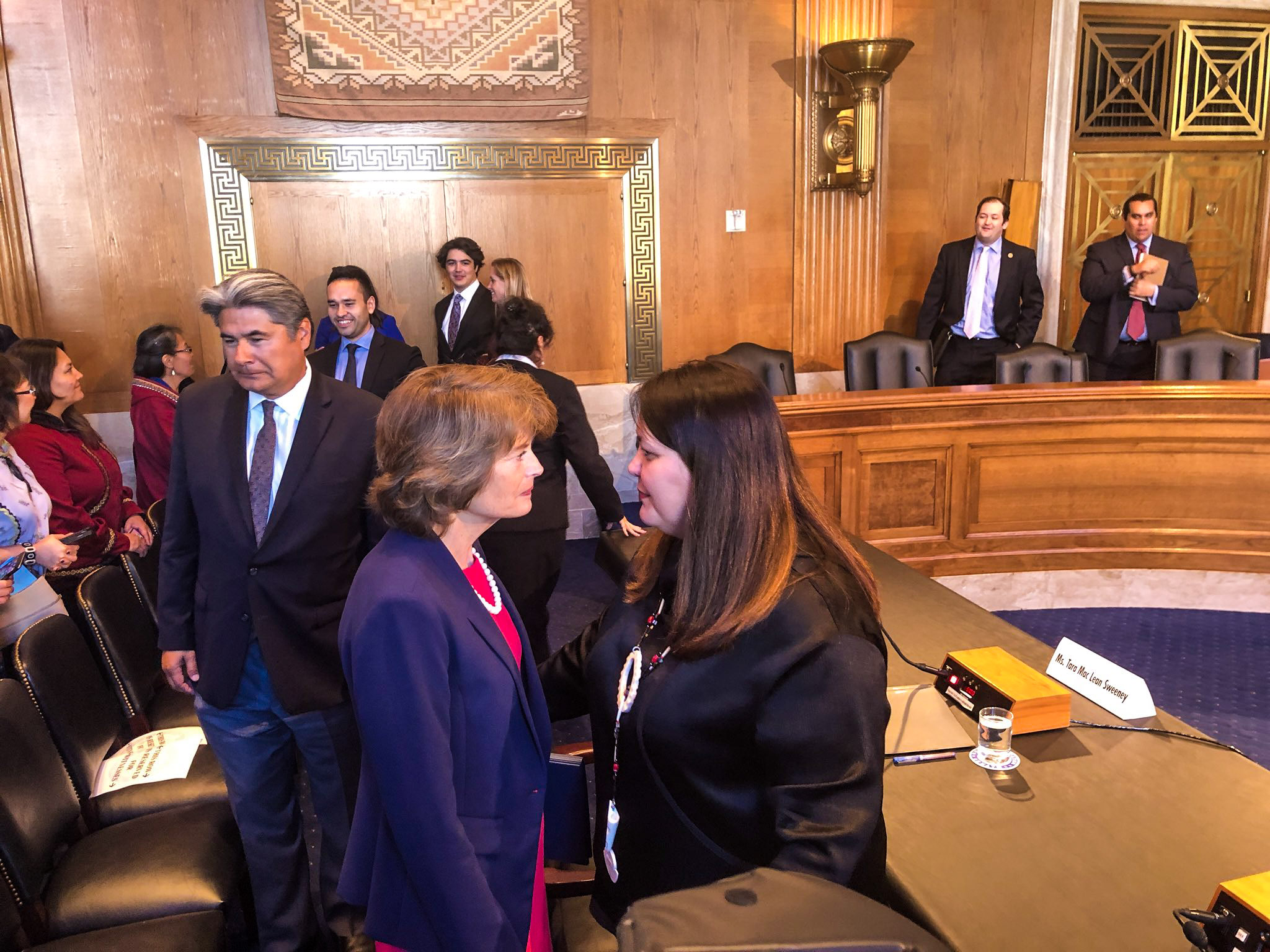Indianz.Com > News > ‘All out war’: Republican lawmaker slams National Congress of American Indians

Republican lawmaker slams National Congress of American Indians
Friday, September 18, 2020
Indianz.Com
A powerful Republican lawmaker is accusing the National Congress of American Indians of engaging in “divisiveness” in connection with a bitter dispute over billions of dollars in COVID-19 relief.
In a stunning four-page letter, Sen. Lisa Murkowski (R-Alaska) on Thursday blasted the nation’s largest Indian Country advocacy organization for getting involved in the ongoing legal and policy dispute. She said NCAI shouldn’t have gone public with opposition to Alaska Native corporations (ANCs) receiving shares of a coronavirus relief fund designed to help tribal governments address the impacts of the global public health crisis.
“I fought hard to ensure that all Native people would be served by the historic Coronavirus Relief Fund (CRF) tribal set-aside,” Murkowski said of the $8 billion authorized by the Coronavirus Aid, Relief and Economic Security Act, also known as the CARES Act.
According to Murkowski, NCAI’s leadership spread disinformation about the distribution of the $8 billion fund. Although the allocation method was solely in the hands of the Trump administration, which was unable to come up with a formula on time, resulting in delayed payments to tribes, she said the organization made unfounded claims about how much money might end up in the pockets of the for-profit ANCs.
“In that period of uncertainty and deep anxiety, one overly simplistic analysis claimed ANCs both sought and would receive up to half of the $8 billion set-aside,” Murkowski told NCAI President Fawn Sharp, the organization’s highest-ranking official. “Rather than trying to dispel confusion, actions of NCAI’s leadership gave credence to this unlikely, divisive, and skewed perception.”
“If NCAI had acted with restraint and awaited verified information, it would have been more fitting to its role as a consensus builder,” added Murkowski, a long-time member of the Senate Committee on Indian Affairs.
Murkowski also said she was upset by NCAI’s efforts to engage with the Department of the Treasury in a government-to-government manner. She cited a letter the organization sent to Secretary Steven Mnuchin back in April, as a tribal consultation process was underway in connection with the $8 billion. “I was disappointed that NCAI made no effort to communicate with the Alaska delegation to understand our perspective or to promote understanding before issuing their April 11, 2020 letter urging Treasury to exclude ANCs,” Murkowski wrote. But what Murkowski left out were her own lobbying efforts. According to documents released as part of ongoing litigation, the very same Alaska delegation secured their own private meeting with the Treasury official in charge of the $8 billion fund. The special meeting was separate from the two consultation calls that were set up for tribal leaders, thousands of whom participated as they worked day and night to prevent the coronavirus from spreading in their communities. The all-Republican Alaska delegation followed up a letter of their own to the Trump administration, which they sent five days before NCAI’s. But after learning of NCAI’s letter, as well as concerns raised by tribes and tribal organizations nationwide, Murkowski and her cohorts refused to sit silent. They came up with an even more detailed letter in which they presented a compromise where ANCs would only receive shares of COVID-19 relief if designated by a sovereign tribal government.Sen. Lisa Murkowski (R-Alaska) is not happy with the National Congress of American Indians. Read this stunning letter/lecture on "Tribal Unity" from a non-Indian Republican member of Congress. #TUID2020 @NCAI1944 #Republicans #Alaska @lisamurkowski https://t.co/8QvaY3HkJt
— indianz.com (@indianz) September 18, 2020


But few in Indian Country are able to attach their names to their concerns, largely because they don’t enjoy the same level of privilege and power afforded to a member of a government institution that currently lacks Native American representation. Not only does Murkowski serve on the Senate Committee on Appropriations, she leads the subcommittee that’s in charge of how much federal funding goes to tribes and their communities. And while Murkowski portrayed her letter to NCAI as an effort to educate “non-Alaskan tribal leaders” about Alaska’s unique history, the underlying dispute is hardly cut and dried. So much so that earlier this week, the D.C. Circuit Court of Appeals — considered second in stature only to the U.S. Supreme Court — put yet another hold on distributing shares of the $8 billion coronavirus relief fund to the Native corporations in Alaska. The September 14 order from the appeals court came just one business day after a panel of three judges on the D.C. Circuit took up the COVID-19 dispute. The hearing was only scheduled to last 30 minutes — but it ended up running over 90 minutes, a sign of the complexity of the matter involving the Department of the Treasury, the agency responsible for distributing the COVID-19 relive to tribes. “There’s a lack of trust that tribal leaders have seen between Treasury and tribes,” Governor Stephen Roe Lewis of the Gila River Indian Community said during a panel hosted by Harvard University on Thursday. “Treasury is trying to fit, you know, a square peg into a round hole and there’s a lot of frustration out there among tribal leaders,” added Lewis, whose own efforts to sway the Trump administration on how to distribute the $8 billion — including a face-to-face meeting with the president on May 5 — went unrealized.Whitesplaining whiner. Conservatives have always devalued strong clear-minded progressives as “devisive”. https://t.co/C4hS0mqO6S
— ndngenuity (@ndngenuity) September 18, 2020
In total, there are more than 200 Native corporations in Alaska — 13 being regional, with the rest at the village level. The state is also home to more than 220 federally recognized tribes, whose governments received shares of the $8 billion fund, just like their counterparts in the lower 48. The Trump administration, however, has not confirmed how much has gone to Alaska tribes. But what little information that has trickled out shows that Alaska tribal governments received far less than the $534 million being held for the ANCs, a disparity Murkowski didn’t discuss in her letter to NCAI. Government attorneys at one point indicated only about $38 million went to Indian nations in Alaska from the first round of payments, which were released behind schedule on May 5. Two additional payments were made in July, also later than promised. Assuming McCowan’s characterizations are true, tribes in Alaska received less than $326 million in COVID-19 relief, again far less than the money being held for the ANCs. Murkowski’s letter isn’t the first time she’s publicly complained about the $8 billion coronavirus relief fund but she’s taken great steps not to be seen as overly critical of the Trump administration. When she has expressed concerns about the executive branch, the president himself has lashed out against her, at one point claiming he would campaign against her should she choose to seek re-election in 2022. Instead, Murkowski found a way to blame tribes for delays in getting the money out even though government attorneys repeatedly admitted in court that Treasury was having trouble coming up with an allocation method. The department failed to make payment within 30 days as required by the CARES Act. Yet states and local governments received their COVID-19 relief without problems. “Tribes play a central part in providing all those essential services for their citizens and they need to be treated like full governments, the same as states,” Governor Lewis said on Thursday.Thank you to everyone who attended our Tribal Unity Impact Days 2020. We had over 1,000 registrants sign up for roundtables with 14 members of Congress, exchanging meaningful dialogue and ideas for a better government to government relationship. pic.twitter.com/dYBp99CTEU
— National Congress of American Indians (@NCAI1944) September 18, 2020
Related Stories
Sen. Lisa Murkowski (R-Alaska) letter on ‘Tribal Unity’ (September 18, 2020)Appeals court hears arguments in COVID-19 funding dispute (September 11, 2020)
Search
Filed Under
Tags
More Headlines
VIDEO: Cody Desautel on tribes and federal forest management
AUDIO: Legislative Hearing on Discussion Draft of Forest Management Bill
Native America Calling: Remembering the 1974 Navajo border town murders
Native America Calling: Can the right approach close the Native immunization gap?
Cronkite News: Long COVID cases remain high in Arizona
Native America Calling: Eyes in the sky for development, public safety, and recreation
Native America Calling: Three new films offer diverse views of Native life
NAFOA: 5 Things You Need to Know this Week
Chuck Hoskin: Cherokee Nation works toward cure for arthritis
Native America Calling: Protecting young people from the down sides of social media
Cronkite News: Fake ‘shaman’ among candidates failing to make Congressional ballot
Native America Calling: New Native voices in poetry
Cronkite News: Tribes air concerns about border at hearing in nation’s capital
Native America Calling: Indiginerds descend on Oklahoma City
Native America Calling: Political leaders target tribes with unfounded claims
More Headlines
AUDIO: Legislative Hearing on Discussion Draft of Forest Management Bill
Native America Calling: Remembering the 1974 Navajo border town murders
Native America Calling: Can the right approach close the Native immunization gap?
Cronkite News: Long COVID cases remain high in Arizona
Native America Calling: Eyes in the sky for development, public safety, and recreation
Native America Calling: Three new films offer diverse views of Native life
NAFOA: 5 Things You Need to Know this Week
Chuck Hoskin: Cherokee Nation works toward cure for arthritis
Native America Calling: Protecting young people from the down sides of social media
Cronkite News: Fake ‘shaman’ among candidates failing to make Congressional ballot
Native America Calling: New Native voices in poetry
Cronkite News: Tribes air concerns about border at hearing in nation’s capital
Native America Calling: Indiginerds descend on Oklahoma City
Native America Calling: Political leaders target tribes with unfounded claims
More Headlines